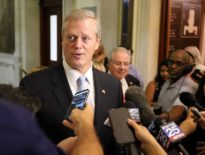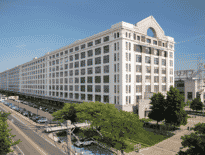
MBTA workers surveyed the scene of a Red Line derailment on June 11, 2019 at the JFK/UMass station. Repairing damage from the incident snarled subway service for months afterwards and led to a scathing independent audit of the T’s safety practices. State House News Service Photo | Chris Lisinski
The Massachusetts House of Representatives approved a major tax bill Wednesday night that Democratic leaders say will generate more than half a billion dollars for transportation infrastructure by increasing taxes or fees on gasoline, corporations, ride-hailing services and vehicle purchases by rental car companies.
Lawmakers voted mostly along party lines in favor of the bill, 113-40, after about eight hours of session that featured little public debate and lengthy periods of public inactivity.
Representatives rejected or withdrew dozens of amendments that would have rewritten key sections of the bill, opting instead to advance a revenue-heavy bill, with few prescriptions for how the money should be spent, similar to the version offered by House Speaker Robert DeLeo and his top deputies.
DeLeo and other elected officials had pledged since last year that they would take action to raise new revenue for transportation, hoping to revitalize the aging and unreliable MBTA system, inject more money into road maintenance, and offer greater support to regional transit authorities.
Wednesday’s vote came after months of behind-the-scenes deliberations and with less than five months of formal lawmaking business remaining before the legislature breaks to focus on elections.
“It has become clearer by the day that the need for more transportation revenue is real and it is immediate,” said Rep. Aaron Michlewitz, chair of the House Ways and Means Committee, during debate. “Whether your constituents come from a district that is considered urban or rural or anything in between, it is undeniable that our transportation system is not meeting the needs that our citizens expect and deserve.”
The Senate is expected to come out with its own transportation funding bill later this spring. Advocates are pushing the Senate to offer a more expansive vision than the House.
Baker Veto Could Be Overridden
Under the bill (H.4508), which Democratic leaders project will bring in $522 million to $612 million per year, the state’s 24-cents-per-gallon gasoline and diesel taxes would increase by 5 cents and 9 cents, respectively.
Those hikes would be the first of their kind since 2013, when Beacon Hill approved a controversial law whose sections indexing the gas tax were repealed by voters in a referendum just one year later. That law increased the gas tax by 3 cents.
Every Republican member of the House voted against the proposed tax increases, as did independent Rep. Susannah Whipps and eight Democrats: Reps. Brian Ashe of Longmeadow, Michelle DuBois of Brockton, Colleen Garry of Dracut, Patrick Kearney of Scituate, John Rogers of Norwood, John Velis of Westfield, and Jonathan Zlotnik of Gardner.
The House shot down amendments from the GOP that would have scrapped or blunted several of the tax and fee hikes. One amendment filed by Minority Leader Brad Jones would have repealed the gas, corporate and vehicle sales tax sections of the bill if and when a surtax on household income above $1 million takes effect.
Republican Gov. Charlie Baker said last week he was “disappointed” with the legislation and opposes both the gas and corporate tax increases, foreshadowing a potential veto that Democrats could override with a two-thirds vote. Based on Wednesday’s results, the supermajority party appears to have the votes for an override if necessary.
No New Tolls, But One-Year Study OK’d
One high-profile amendment withdrawn was a Brookline Rep. Tommy Vitolo recommendation to tack on two more 5-cent increases to the gas and diesel taxes in 2022 and 2024. Like several of the fare-free proposals, that amendment was not explained or debated on the floor.
DeLeo’s team has referred to the current bill as a “bridge” to the 4 percent surtax, sometimes referred to as the “Fair Share Amendment” or “Millionaires Tax,” that is on track to appear before voters on the 2022 ballot. Supporters say that hike could generate up to $2 billion per year for education and transportation needs. Estimates put the state’s transportation infrastructure needs over the next 20 years at around $50 billion.
The legislation does not call for adjustment of roadway tolls to incentivize off-peak travel, a practice referred to as congestion pricing, but it does require a one-year study of the topic.
Rep. Alice Peisch of Wellesley filed an amendment that would have required the Department of Transportation to deploy tolls across the state and use congestion pricing, but she scaled back her proposal to require only that MassDOT develop a plan to implement the study’s recommendations. The House adopted her updated amendment.
“The commonwealth’s worst-in-the-nation traffic is holding back our economy and hurting our quality of life,” Chris Dempsey, executive director of the Transportation for Massachusetts advocacy coalition, said in a statement. “As this proposal moves to the Senate, it will be critical to match the ambition of the commission with real-world piloting and testing of pricing concepts so that Massachusetts drivers can see the benefits of a policy that is working in Seattle, Washington D.C., and other peer regions.”
Although the legislation dedicates new $27 million streams to both the MBTA and the state’s regional transit authorities, it does not come close to spending all of the $552 million-plus it could generate. Democratic leaders say they will instead use the new funding to make larger budgetary allocations later in the spring and to backstop borrowing, with a $14.5 billion transportation bond bill (H.4506) on deck for a Thursday session.
Most policy changes representatives sought to the bill were unsuccessful during Wednesday’s session.






